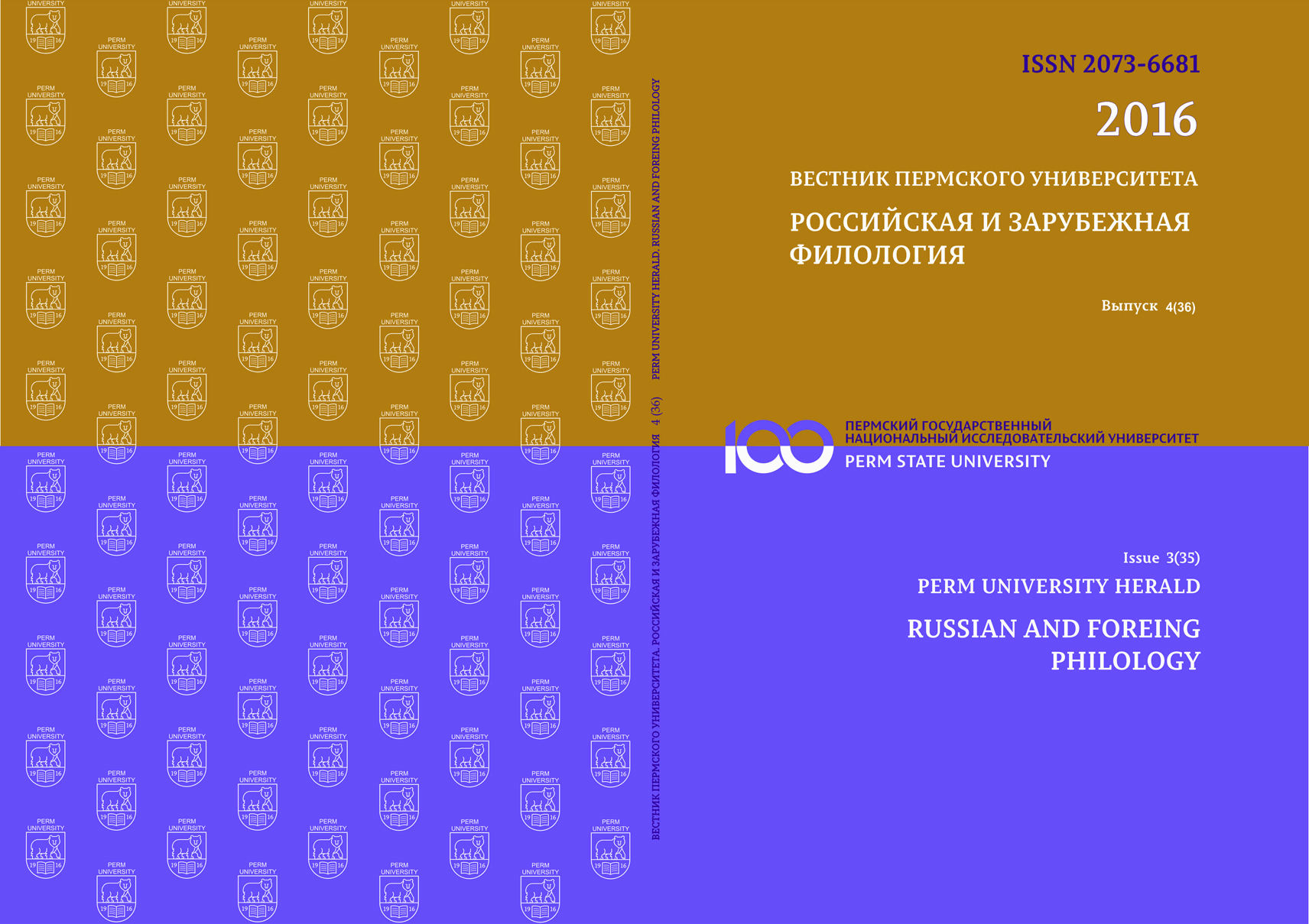MASS CONSCIOUSNESS MANIFESTATION IN THE ONLINE POLITICAL DISCOURSE
DOI:
https://doi.org/10.17072/2037-6681-2016-4-83-91Keywords:
online political discourse, comment, informativity, mass consciousness, affectivity, stereotype.Abstract
The author proves that users’ comments in the Runet political segment are produced under the influence of mass consciousness. The analysis has shown that the main differential characteristics of the discourse under consideration are as follows: the increased affection and decreased rationality; anonymity and lessened sense of users’ personal responsibility; mosaic, indistinct and fragmentary ideological attitudes of communicants; stereotypes of social and political reality in the country and impersonality of the produced verbal structures, as well as the dynamism and variability of the expressed ideologemes. The opposition-minded Runet users are united in a mass with a sense of hostility toward the government and its supporters, which they express in their comments. The communicants frequently use negative, sometimes invective, vocabulary, they regularly break ethical standards and the law, manifest stereotypes and take no notice of ideological differences between political groups.References
Бахтин М. М. Под маской. Маска третья // Волошинов В.Н. Марксизм и философия языка. М., 1993. 153 с.
Бахтин М. М. Проблема речевых жанров // Бахтин М. М. Эстетика словесного творчества. М.: Искусство, 1979. 424 с.
Васильева В. В., Салимовский В. А. О механизме продуцирования массмедийного политического текста // Мысль. Текст. Стиль: сб. ст., посвящ. д-ру филол. наук, проф. К. А. Роговой / под ред. Л. Р. Дускаевой и В. И. Конькова. СПб., 2011. С. 43–51.
Гальперин К. Р. Текст как объект лингвистического исследования. М.: Наука, 1981. 139 с.
Грушин Б. А. Массовое сознание: Опыт определения и проблемы исследования. М.: Политиздат, 1987. 368 с.
Лебон Г. Психология народов и масс. СПб., 1896. 371 с.
Майерс Д. Социальная психология. 7-е изд. СПб.: Питер, 2005. 794 с.
Мехонина Е. Н. Коммуникативно-речевая категория враждебности // Научные ведомости Белгородского государственного университета. 2015. № 18(215). Вып. 27. С. 149–155.
Одинцов В. В. Стилистика текста. М., 1980. 263 с.
Ольшанский Д. В. Психология масс. СПб.: Питер, 2002. 368 с.
Салимовский В. А., Ермакова Л. М. Экстремистский дискурс в массовой коммуникации Рунета // Вестник Пермского университета. Российская и зарубежная филология. 2011. Вып. 3(15). С. 71–80.
Салимовский В. А., Мехонина Е. Н. Типичные ошибки (уловки) в ненадлежащей судебно-лингвистической экспертизе // Вестник Пермского университета. Российская и зарубежная филология. 2010. Вып. 2(8). С. 48–51.
Словарь русского языка: в 4 т. М.: АН СССР, 1981–1984. Т. 2. 736 с.
Фрейд З. Массовая психология и анализ человеческого «Я» // Фрейд З. Я и Оно: Сочинения. М.: ЗАО Изд-во ЭКСМО-Пресс; Харьков: Изд-во «Фолио», 2000. 1040 с.
Экспериментальная психология: сб. статей / ред.-сост. Ж. Пиаже, П. Фресс; пер. с франц. М.: Прогресс, 1975. Вып. 5. 284 с.
McDougall W. The Group Mind. Cambridge: Univ. Рress, 1920. 452 p.
References
Bakhtin M. M. Pod maskoj. Maska tret’ya [Under a mask. The third mask]. Voloshinov V. N. Marksizm i filosofiya yazyka [Marxism and philosophy of language]. Moscow, 1993. 153 p.
Bakhtin M. M. Problema rechevykh zhanrov [The problem of speech genres]. Estetika slovesnogo tvorchestva [Aesthetics of verbal art]. Moscow,
Iskusstvo Publ., 1979. 424 p.
Vasil’eva V. V., Salimovskij V. A. O mekhanizme producirovaniya massmedijnogo politicheskogo teksta [On the mechanism of producing massmedia political text]. Mysl’. Tekst. Stil’: sb. statej, posvyashhennyj dokt. filol. nauk, prof. K. A. Rogovoj [Thought. Text. Style: collection of works dedicated to Dr. philol. sci., prof. K. A. Rogova]. Ed. by L. R. Duskaeva, V. I. Kon’kov. St. Petersburg, 2011. P. 43–51.
Gal’perin K. R. Tekst kak ob’ekt lingvisticheskogo issledovaniya [Text as the object of linguistic research]. Moscow, Nauka Publ., 1981. 139 p.
Grushin B. A. Massovoe soznanie: Opyt opredeleniya i problemy issledovaniya [Mass consciousness: the experience of determination and research problems]. Moscow, Politizdat Publ., 1987. 368 p.
Le Bon G. Psikhologiya narodov i mass [The Psychology of Peoples]. St. Petersburg, 1896. 371 p.
Myers D. Social’naya psikhologiya (7-e izd.) [Social psychology (7th ed.)]. St. Petersburg, Piter Publ., 2005. 794 p.
Mekhonina E. N. Kommunikativno-rechevaya kategoriya vrazhdebnosti [Hostility as a communicative speech category]. Nauchnye vedomosti Belgorodskogo gosudarstvennogo universiteta. Gumanitarnye nauki [Belgorod State University Scientific Bulletin. Humanities]. 2015. Iss. 18(215). Vol. 27. P. 149–155.
Odincov V. V. Stilistika teksta [Stylistics of text]. Moscow, 1980. 263 p.
Ol’shanskij D.V. Psikhologiya mass [Psychology of the masses]. St. Petersburg, Piter Publ., 2002. 368 p.
Salimovskij V. A., Ermakova L. M. Ekstremistskij diskurs v massovoj kommunikacii Runeta [Extremist discourse in the Runet communication]. Vestnik Permskogo universiteta. Rossijskaya i zarubezhnaya filologiya [Perm University Herald. Russian and Foreign Philology]. 2011. Iss. 3(15). P. 71–80.
Salimovskij V. A., Mekhonina E. N. Tipichnye oshibki (ulovki) v nenadlezhashhej sudebno-lingvisticheskoj ekspertize [Typical mistakes (tricks) in improper forensic linguistic expertise]. Vestnik Permskogo universiteta. Rossijskaya i zarubezhnaya filologiya [Perm University Herald. Russian and Foreign Philology]. 2010. Iss. 2(8). P. 48–51.
Slovar’ russkogo yazyka (v chetyrekh tomakh) [Dictionary of the Russian language (in 4 vol.)]. Moscow, Academy of Sciences of the USSR Publ., 1981–1984. Vol. 2. 736 p.
Freud S. Massovaya psikhologiya i analiz chelovecheskogo “Ya” [Group Psychology and the Analysis of the Ego]. Freud S. Ya i Ono: Sochineniya [The Ego and the Id: works]. Moscow, EKSMO-Press Publ.; Kharkov, Folio Publ., 2000. 1040 p.
Eksperimental’naya psikhologiya: sbornik statej [Experimental psychology: collection of works]. Ed. by J. Piaget, P. Fraisse. Transl. from French. Moscow, Progress Publ., 1975. Vol. 5. 284 p.
McDougall W. The Group Mind. Cambridge, Univ. Press, 1920. 452 p.




